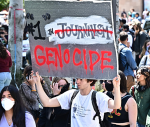You are here
Majority of Jordanians label bad economy as major challenge
By Dana Al Emam - May 07,2015 - Last updated at May 07,2015
AMMAN — Up to 88 per cent of Jordanians consider poverty, unemployment and price hikes the biggest challenges facing the Kingdom, according to a recent poll by the University of Jordan’s Centre for Strategic Studies (CSS).
Moreover, around 35 per cent of Jordanians said they thought about living abroad for various durations, with 84 per cent of them attributing that to economic reasons.
The national survey is part of a regional project that seeks to examine the public's beliefs, behaviours and future expectations concerning political and socio-economic conditions after the "Arab Spring" in Jordan, Morocco, Tunisia, Algeria, Iraq, Egypt and Libya, said the centre's director, Musa Shteiwi.
The study targeted a sample of 2,000 males and females above 18 in the seven countries, and was conducted through face-to-face interviews June 6-20, 2014.
Around 70 per cent of those surveyed in Jordan said they lead similar or better lives than other people in Jordan, yet only 40 per cent of the local sample said they are satisfied with Jordan’s economic growth.
When asked to specify the time when national economic conditions were “good”, around 80 per cent of the respondents said five years prior to the survey.
Security
Jordanians expressed satisfaction with the performance of security bodies, with 95 per cent saying they feel safe at their residences during the day and 90 per cent feeling safe at their residence at night.
However, over 80 per cent consider refugees a source of danger to Jordan, while 77 per cent said migrant workers pose a threat to the safety of the community.
Political reform
Over 70 per cent want a parliamentary system where nationalist, rightist, leftist and Islamist political parties compete for political representation in Jordan. However, around 50 per cent are satisfied with the development of democracy in Jordan.
Nonetheless, around 90 per cent said favouritism is a way to get a job in Jordan, while around half of the surveyed sample was satisfied with the healthcare and education systems.
Around 80 per cent of surveyed Jordanians said corruption exists in government bodies, with only 45 per cent believing that government is actually fighting corruption.
Overall, some 70 per cent of the sample said they can freely criticise the government.
Arab Spring
When asked to name the demands of change in the region, a total of 38 per cent of Jordanians called it “Arab destruction”, while 33 per cent called it “a conspiracy against Arabs”.
Shteiwi cited a trend even among scholars and thinkers to attribute the “Arab Spring” to a conspiracy theory, citing some 60 per cent of surveyed Jordanians claiming that the Arab Spring is a result of a conspiracy and 37 per cent of the sample thinking that those who took to the streets during the uprising are driven by foreign forces.
Nevertheless, a majority acknowledged that demonstration in the region contributed to the creation of an environment with a larger respect for freedoms.
Jordanians think of Israel and Iran as the biggest external threat to the region.
Political participation and gender
Around half of the sample said non-Muslims living in a Muslim state should have less right to political participation, while around 70 per cent believe that a Muslim should be killed if he/she converts to another religion.
Only half of the sample agreed to coeducation, while around 80 per cent think Islamic states should ban banks from taking interest.
Around 70 per cent said lawmakers should only implement laws that are based on Sharia (Islamic law).
Moreover, around 70 per cent believed males are more competent as leaders than females, while around one-third of the sample believed that education for males is more important than it is for females.
Shteiwi said results of all participating countries as well as further analysis of data will be compiled in a detailed report.
Attending the launch of the study’s results, Minister of Political and Parliamentary Affairs Khaled Kalaldeh highlighted the role of the CSS as a leading polling institution that helps politicians in decision making.
“Society needs experts that analyse phenomena and draw up frameworks that decision makers can build upon,” he said.
Related Articles
AMMAN — Over 55 per cent of Jordanians and 63 per cent of opinion leaders believe that the situation in Jordan is going in the right directi
AMMAN — Over 35 per cent of Jordanians and 44 per cent of opinion leaders believe that the overall situation in Jordan is going in the right
AMMAN — A total of 65 per cent of the country's opinion leaders expect the draft elections law to result in a better parliament than the cur
















